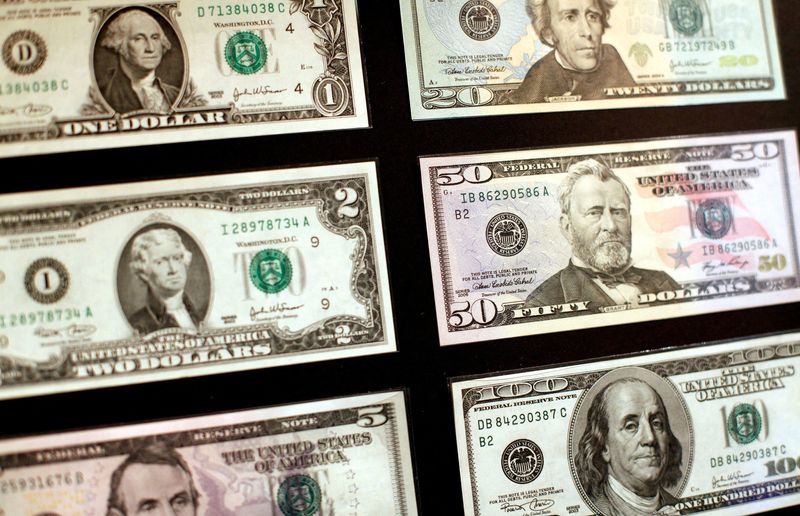Column-G7 ‘recognizing’ FX disruption is damp squib :Mike Dolan By

© Reuters. FILE PHOTO: U.S. dollar banknotes are seen at the Museum of American Finance in New York on October 15, 2010. REUTERS/Shannon Stapleton//
By Mike Dolan
LONDON (Reuters) – Japan’s solo battle against an overvalued U.S. dollar may feel a little lonelier after it met G7 finance chiefs in Washington this week – and possible yearend market ructions may see its allies regret that.
After heavy lobbying from Tokyo and some considerable market speculation about sterner language to calm unruly exchange rates, economic powers gathering at the annual International Monetary Fund meeting ended up giving one of the brightest green lights possible for further disruptive dollar gains.
That is even as the dollar’s 20% surge against the major currencies over the past year unnerves wider financial markets and government finances. An eye-watering 30% surge in just 12 months to 32-year highs against the yen this week has already drawn $20 billion in unilateral dollar sales by the Bank of Japan, while the swinging 27% jump to record highs against an ailing sterling at one point last month further unsettled restive UK asset markets.
With geopolitical tensions rendering the wider G20 finance grouping barely functional, finance ministers and central bank chiefs from G7 allies met separately – and with myriad pressing issues from the energy crunch, war in Europe and climate change.
Their joint communique released by the U.S. Treasury late on Wednesday did give Japan something – but it was thin gruel.
“Recognizing that many currencies have moved significantly this year with increased volatility, we reaffirm our exchange rate commitments as elaborated in May 2017,” the G7 wrote.
And, for the record, the 2017 phraseology was that excess volatility and disorderly currency moves have negative impacts on their economies and financial stability.
Maybe that is all they wanted or needed to say, short of action. But the choreography lacked punch, to say the least – the slightly jaded reference back to a five-year old formulation giving the impression of afterthought, or an issue most did not want to take head on right now.
It was especially lukewarm given how Japan’s Finance Minister Shunichi Suzuki claimed he conveyed the problem to his counterparts – how he was “deeply worried” about sharply rising volatility”.
“We cannot tolerate excessive volatility in the currency market driven by speculative moves,” he opined after. “We’re watching currency moves with a strong sense of urgency.”
Judging by a seismograph that is contained in three-month currency options, the implied volatility of G4 currency pairs has more than doubled over the past year to the peaks of the pandemic shock.
But the final G7 statement seemed to accept it as a fact of life, reflecting the more aloof take on events from IMF chief economist Pierre-Olivier Gourinchas earlier in the week.
Gourinchas acknowledged dollar strength was putting a lot of strain on countries but insisted it was…
Read More: Column-G7 ‘recognizing’ FX disruption is damp squib :Mike Dolan By
